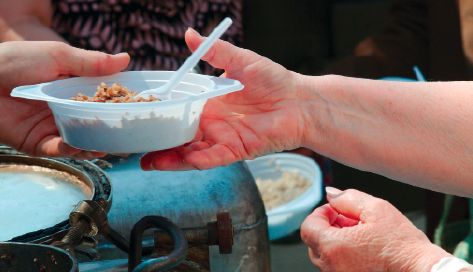By Christy Barritt
City Policies May Hurt the Poor
A report by the National Coalition for the Homeless claims that a number of myths have led countless cities and towns across the country to wrongly limit food distribution and support for the homeless.
The report, “Share No More: The Criminalization of Efforts to Feed People in Need,” asserts that 21 cities have restricted food sharing programs since January 2013 and many other localities are exploring similar restrictions. For example, some cities now require groups to have permits before handing out food in public places, which keeps organizations from engaging in the effort.
The report was released one day before officials in Fort Lauderdale, Florida, approved a set of food distribution restrictions requiring organizations distributing food outdoors to provide portable bathrooms for both their workers and the homeless.
Selfies May Be Narcissistic
A study by the University of Georgia suggests that people who take self-portraits, also known as selfies, may be narcissistic. Researchers for the study are trying to determine whether some people’s constant desire to snap pictures of themselves suggests that they are more self-absorbed.
Head researcher Dr. Keith Campbell said that, in general, he’s found that selfies are motivated by three factors: self-absorption, art, or social connection. Also of note within the study: career experts often feel that taking too many selfies may demonstrate a “lack of self-control” to potential employers. Campbell said selfies are growing in popularity on a “massive scale,” which is one of the reasons he’s studying the trend.
Terminally Ill Teen Plays First College Ballgame
Lauren Hill, age 19, was told in September that she only had months to live. Her one request was that she be able to play her first college basketball game.
Lauren was diagnosed in 2013 with Diffuse Intrinsic Pontine Glioma (DIPG), a rare pediatric brain cancer. Just weeks before the diagnosis, she had decided to attend Mount St. Joseph University in Cincinnati, Ohio and play basketball.
The NCAA allowed Mount St. Joseph to hold its opening game a few weeks early, before Lauren’s condition worsened. Her story spread across the nation, and more than 10,000 people attended, including sports celebrities.
Though her strength was waning, Lauren played a short time, scoring the opening basket and final layup of the game. The event and online auction raised more than $80,000 for DIPG. “Today has been the best day I’ve ever had,” Lauren said. “I don’t know what else to say but thank you.”
Americans Support Quarantines
A CBS poll finds that Americans overwhelmingly support quarantine for travelers arriving from West Africa: 80 percent of those polled think U.S. citizens and legal residents returning from West Africa should be quarantined upon coming back to the U.S. until it’s certain they don’t have Ebola; only 17 percent think Americans should be allowed to enter as long as they don’t show symptoms of the virus.
Americans are even more rigid when it comes to foreign visitors from West Africa coming into the country. Only 14 percent think they should be allowed to enter the U.S. as long as they show no symptoms of the virus, 56 percent think they should be quarantined upon arrival, and 27 percent don’t think they should be allowed to enter the U.S. at all until the Ebola epidemic is over.
Also 56 percent do not think the federal government is adequately prepared, and 32 percent of Americans are very concerned that this virus will become an epidemic on our own soil.
 Christy Barritt is an award-winning author in Chesapeake, VA (christybarritt.com). She and her husband, Scott, have two sons.
Christy Barritt is an award-winning author in Chesapeake, VA (christybarritt.com). She and her husband, Scott, have two sons.



Comments: no replies